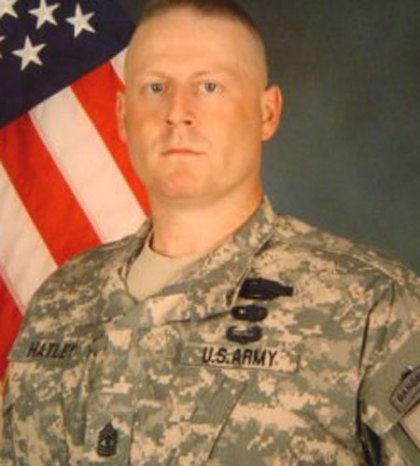
The following information related to the case of U.S. Army First Sergeant John Hatley is currently sitting on the desk of President Donald J. Trump for consideration to invoke his statutory powers under 10 U.S. Code Sections 822 and 860 to disapprove the findings and the sentence or provide a full and unconditional pardon.
First Sergeant John Hatley was convicted in 2009 of premeditated murder of four Iraqi detainees in Iraq, and sentenced to life in prison, despite pleading NOT GUILTY and the U.S. Government producing:
- NO BODIES: Prosecution presented NO bodies, despite a 7-man Criminal Investigation Command (CID) SCUBA team searching the canal in which, allegedly, the bodies were left.
- NO FORENSICS: Prosecution introduced NO forensic evidence, i.e., evidence obtained by scientific methods such as ballistics, blood test, DNA, etc…
- NO HARD EVIDENCE: CID found NO hard evidence (e.g. bullets, shell casings, clothing, blood, bone, etc.) despite a purported “eyewitness” identifying the alleged “crime scene.”
- NO ONE MISSING: CID conducted extensive interviews with the supposed family and neighbors of the alleged “victims” who all stated that NO one was killed nor missing.
- NO CRIME: CID interviewed the local Iraqi farmer who owned the land on which the alleged “murders” occurred. He stated NO “crime,” occurred on his land, and he would have known.
- ONLY COMPELLED STATEMENTS: The only “evidence” presented was from compelled statements of a few soldiers who had taken pre-trial agreements in exchange for testimony.
BACKGROUND
Hatley is a 50-year-old married beloved native of Texas with one young son. He served almost 20 years in the Army with an outstanding and extensive combat and military record as a Paratrooper, Ranger, and Infantryman with two Bronze Star Medals.
SITUATION
In 2007, Iraqi insurgents attacked Hatley’s combat patrol. In response, Hatley pursued the insurgents into a nearby house. After locating a cache of machine guns, sniper rifles, bulletproof vests, night vision goggles, and binoculars in the house, Hatley decided to take the occupants of the house to the Detainee Holding Area (DHA).
However, after consulting with other NCOs, and concerned the DHA would not keep the detainees in custody, Hatley chose instead to release the detainees away from where he captured them. This was to ensure they would be unable to regroup and attack prior to Hatley’s patrol returning to base.
At the release point, Hatley’ soldiers removed the detainees’ handcuffs and blindfolds and he directed the detainees to leave.
Almost a year later, a soldier who was pending unrelated legal charges for threatening a commissioned officer and striking two junior NCOs fabricated false accusations against Hatley in exchange for exoneration of his own charges.
U.S. Army Criminal Investigators and JAG Prosecutors aggressively went after Hatley. They built their entire case upon this soldier’s allegations and coerced testimony from other junior soldiers who they threatened with murder charges.
To get the other soldiers to testify against Hatley, they generated false testimony accusing them of murder, which they falsely stated was written by “1SG John Hatley” and included Hatley’s forged signature.
Hatley was convicted of four counts of premeditated murder and sentenced to life in prison, despite there being no bodies, no forensics, no hard evidence, no one missing, and no locals witnessing the crime.
Hatley never admitted guilt and maintains his innocence to this day.
STATUS OF CASE
In 2016, with the help of UAP the US Army Clemency and Parole Board reduced Hatley’s sentence to 25 years.
Since Hatley refused to admit guilt for a crime he did not commit, the US Army Clemency & Parole Board denied Hatley parole citing, Hatley was not sufficiently accepting of responsibility for his conviction.
In 2019, with support from UAP and the “Justice for Warriors” caucus, Hatley was granted Parole and released in Oct, 2020.
Consistent with the President’s vow to end the “endless war” in Iraq —
HATLEY IS RESPECTFULLY REQUESTING THE PRESIDENT OF THE UNITED STATES INVOKE HIS STATUTORY POWERS UNDER 10 USC SECTIONS 822 AND 860 TO DISAPPROVE THE FINDINGS AND THE SENTENCE OR PROVIDE A FULL AND UNCONDITIONAL PARDON.








